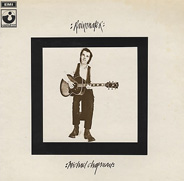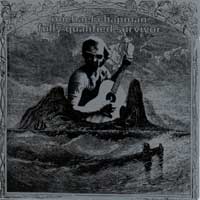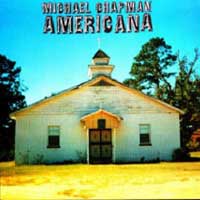- cd reviews |
Some Instrumental Acoustic Players |
contact us | back to main page | how to book michael chapman By Mark Harrison - Sept 2007 |
|
One of the many relatives in the extended family of blues music is the acoustic guitar player purveying a wholly instrumental repertoire.This relative, unlike the brasher, more visible members of the family, doesn’t get plastered at family dos or go in for attention-seeking excitability. Instead, he sits in the background getting on with his own thing, and anyone who’s willing to listen is welcome to do so. He doesn’t do requests, unless he’s feeling a bit contrary, in which case he’ll divvy up a barely recognizable but far more interesting version of a well-known tune. He’s also spent years turning into a highly individualistic virtuoso on the instrument, but the casual listener will think a lot of what he does is pretty straightforward. He gives off an air of being harmless and genial, but anyone bothering to speak to him discovers that he’s a whole lot odder, and more interesting, than the show-offs making all the noise.
Michael Chapman
 |
Michael Chapman is the only English player I’m aware of who produces this kind of music. He’s been making good music of one sort or another since the late 60s, and instrumental guitar albums are just one part of his output.
Chapman as an artist doesn’t belong in any firm category. His work has always included elements of blues, folk, country and rock, but he’s never actually done any straight blues, folk, country or rock numbers. He writes his own stuff and it’s a mixture of all these styles. He sings with an instantly recognizable gruff, slightly slurred, world-weary voice and he’s a true original. From 1969 to 1972 he made four albums for EMI’s high-profile Harvest label, on which some of the best-known bands of that golden period resided, and he was up there with some of the better known people in recognition and on the college and festival circuit. These albums, Rainmaker (1969), Fully Qualified Survivor (1970), Window (1971) and Wrecked Again (1972), still stand tall today.
When everyone like him was swept aside in the mid to late 70s Year Zero cull of just about anyone who’d been making records up to that point, he carried on ploughing his own furrow and making records for the hard core of devotees that stuck with him. He went down various avenues, including New Age music in the 80s, re-emerging from the mid 90s to the present day with albums in the distinctive style of his earlier great works. Today he continues as a working/gigging musician, playing folk clubs and the like, and if you get a chance to go and see him, you should take it. The voice is even gruffer than in the early heyday, but one thing that is unchanged is the guitar chops that put him in the very front rank of acoustic guitar players.
Chapman palled up with Fahey in the late 70s, and a scary pair of curmudgeons they must have been. The younger Chapman wasn’t renowned for sobriety or impeccable manners to all-comers, putting him right up Fahey’s street (he’s an altogether mellower fellow now).
They travelled and gigged together for a bit, and doubtless found much common ground. Certainly they would have been a mutual admiration society playing-wise.
Chapman’s early albums always included a couple of instrumentals in the blues/ragtime vein, but he didn’t do a wholly instrumental album until fairly recently. Following a trip around the southern states of the US, he issued two, Americana (2001) and Americana II (2002). These albums were re-released as a double CD in 2006, and they’re both excellent. They contain a wide variety of styles, including blues, folk, ragtime and meditative, even hymnal pieces, and there’s even a bit of electric guitar along the way. There’s a terrific clarity to the playing, a wide variety of tempos and many of the pieces are wonderfully atmospheric. The booklet notes include information on the places and experiences that inspired each of the pieces during Chapman’s travels, and some terrific photos taken by Chapman and his wife. The tunings for each piece are also given.
In recent years, Chapman has been releasing CDs himself, on his own Rural Retreat label, and one of the more recent of these is Words Fail Me (2006), an instrumental double CD available from his website. This is a straight guitar album, no effects or overdubs, and it includes pieces from the whole of Chapman’s career, right back to his first album, and right up to reworkings of one or two of the Americana pieces. The tunings and guitars used are listed for those who want to know that sort of stuff, and it’s a very fine record indeed, containing all Chapman’s trademark strengths in picking and coming up with memorable melodies. It would sound good at any time and in any age.
Michael Chapman is a wonderful guitar player and he’s no Fahey clone. He has his own distinctive style and sound, and though he’s broadly in the territory that Fahey was in, he stands on his own as an original player. Whether it’s some of the tunings he favours, or just the sound he coaxes from his various guitars, he isn’t like anyone else, and the trademark Chapman instrumental sound soon becomes instantly recognizable. It’s almost a criminal offence that Michael Chapman isn’t more revered than he is, and for years he’s been an almost secret that should be right out in the open.
Preview: Michael Chapman
By Mark Harrison Feb 2010
Back in the glory days, when just about everything in ‘popular’ music that you might like was being invented, Michael Chapman was very much a face on the scene. In those days, say 1968-1973, music wasn’t compartmentalised. If you went to a gig at a college or if you went to a festival, all sorts would be on the bill, from rock acts to folkies to blues bands to jazz musicians, poets, what became known as ‘world music’ and so on. Your record collection would have included any or all of these. You might have liked Bert Jansch as much as you liked Led Zeppelin or Zappa. And your record collection might well have included one or more of Michael Chapman’s great early albums.
|
Michael Chapman started off as a recording artist on the Harvest label. It was EMI’s very high-profile imprint for what started life being called ‘progressive’ music and wound up being the mainsteam for a while. There was a place for people like him in this set-up. Some of the artists didn’t necessarily sell many copies (Nick Drake on Island is the ultimate example of that) but they were very much part of the scene. And Michael’s albums were very good indeed and highly regarded. Today, those four Harvest albums (Rainmaker, Fully Qualified Survivor, Window and Wrecked Again), the second of which was one of John Peel’s albums of the year in 1970 (he championed Michael), very much stand the test of time. Easily available, they are well worth seeking out.
Fast forward all these years, and Michael, like many of his contemporaries in what we could loosely call the ‘roots’ music world, is very much still standing. For some reason, though, he hasn’t quite acquired the legendary status he deserves. Perhaps that has something to do with the fact this his music doesn’t fit neatly into a simple category. It contains elements of folk, blues, country, rock and singer/songwriter. He’s not part of any particular world. He plays a lot of folk clubs, but he’s not a folk act in the way that, say, Jansch is. He does mostly his own material, and although it’s one man and his guitar, it isn’t like a lot of the material done by folk mainstays. There’s always been a bit of a rock edge to Michael Chapman (in the best sense of that) – for example, Mick Ronson was playing on his albums before he got the Bowie gig that made his name.
Since his time somewhere near the spotlight back in those days, he’s been operating pretty much under the radar, but with no let-up in creativity or quality. Dumped by record companies like so many of his contemporaries in the second half of the 70s in the punk panic, he continued to release albums on a succession of small labels and in recent years has been putting them out himself. They’re all very good.
Michael Chapman’s highly individual style is marked by two main features – his quite wonderful guitar playing (he’s up there with the very best acoustic guitar players) and his gruff and husky vocals. The latter, it’s probably fair to say, have got even gruffer and huskier with the passing of time, but the guitar chops are undiminished. Indeed, he has made a few instrumental albums in recent years (Americana I and 2 and Words Fail Me) that are brilliant examples of the genre and also well worth seeking out.
Michael Chapman is still writing really good songs and putting out fine albums. The blues, folk, country and rock elements are all still there, and he remains very much his own man, not tied to any particular genre. If you want a masterclass in acoustic guitar playing (including some highly individualistic slide playing), go see him. The best artists who got going back in the 60s and 70s and are still going are usually still viable for the simple reason that they’re very good and they have something original to offer. Michael Chapman belongs to that distinguished band.
both articles from Blues In London (http://www.bluesinlondon.com/) reproduced with permisson



